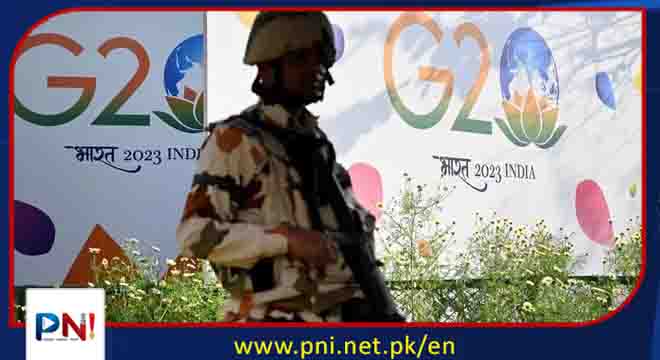LAHORE, May 21 (APP): The global stand taken on the Srinagar meeting by the G20 members and others has recently been preceded by a UN official’s statement, criticising India for holding the moot at the Illegally Occupied Jammu and Kashmir (IIOJK).
On May 15, Fernand de Varennes, UN Special Rapporteur on Minority Issues, said: “By holding a G20 meeting of the working group on tourism on 22-24 May, the Government of India is seeking to normalise what some have described as a military occupation by instrumentalising a G20 meeting and portray an international ‘seal of approval’.”
He warned the G20 of “unwittingly providing a veneer of support to a facade of normalcy at a time when massive human rights violations, political persecutions, illegal and arbitrary arrests, restrictions and even suppression of free media and human rights defenders continue to escalate.”
The major diplomatic setback India faced when China said on Friday that it was opposed to a G20 tourism meeting on May 22 in the disputed Himalayan territory of Kashmir, and it would not attend it. “China is firmly opposed to holding any kind of G20 meetings in disputed territory, and will not attend such meetings,” Chinese Foreign Ministry spokesperson Wang Wenbin said in his statement.
The meeting was scheduled to be the biggest international event in the Indian occupied Kashmir after the special status of the erstwhile state of Jammu and Kashmir (J&K) was revoked, and it was split off from Ladakh.
Holding the meeting in J&K was apparently showcasing its potential, though hidden beneath it was Indian’s nefarious agenda.
The hype about the G20 working group on tourism holding a meeting in occupied Kashmir was lowly coming unstuck. Some members of the G20 decided not to attend at all while some others scaled down their participation.
Kashmir has been a burning issue since the Partition of the Indian Subcontinent in 1947. Pakistan and India have fought three wars over Kashmir in 1948, 1965, and 1999, but have been unable to settle the dispute.
Since 1947, Article 370 had given Jammu and Kashmir a semi-autonomous constitutional status. Earlier, under its provisions, the region had freedom in all matters except its constitution, legislature, flag, foreign affairs, communications and defence.
The UNSC resolution of April 21, 1948, one of the most important resolutions on the Kashmir dispute, resolved: “Both India and Pakistan desire that the question of the accession of Jammu and Kashmir to India or Pakistan should be decided through the democratic method of a free and impartial plebiscite.”
The mutual agreement between India and Pakistan to solve the issue through the United Nations led the UNSC and the United Nations Commission for India and Pakistan (UNCIP) to pass several resolutions on the Kashmir dispute.
The basic resolutions, passed by the UNSC and UNCIP in 1948, for resolution of the Kashmir dispute, were categorically affirmed and reaffirmed by the UNSC in its resolution No. 91/1951 and 122/1957.
After the Partition of Indian Subcontinent, millions of Kashmiris felt unsafe and uncertain about their fate. They were required to accede to either of the two countries on the basis of wishes of their people and the geographical location.
Earlier, Modi-led BJP government imposed a lockdown in the occupied Kashmir, allowing Indian forces to perpetrate unspeakable crimes against masses, with complete impunity. According to Kashmir Media Service report, APHC leader Muhammad Yusuf Naqash condemned the crackdown and unjustified arrests of innocent Kashmiris by the Indian forces under the guise of the G20 meeting in Srinagar. Naqash said the whole world is well aware that Jammu and Kashmir is a disputed territory, recognised by the United Nations and the August 5, 2019 unilateral Indian actions have made Kashmiris even more helpless to speak against Indian intentions.
Ending the old status of Kashmir and conducting G20 meeting is an attempt to usurp the rights of Kashmiri people by eradicating their fundamental rights related to their social, linguistic, cultural, economic and political existence, he said.
Meanwhile, the APHC urged Kashmiri people for a complete shutdown in the held Valley on May 22, against the hosting of G20 meeting in Srinagar by the Indian government.
The Indian forces are using rape, molestation and sexual violence against women and children as a weapon of war, besides awarding collective punishment, in a bid to suppress the legitimate freedom movement in the occupied valley,” former senator from Pakistan People’s Party (PPP), Sehar Kamran (TI) told APP.
Kashmiris have been stating for decades that India intended to settle paramilitary families and military settlements there, as well as establishment of semi-permanent military colonies in Kashmir, she said and urged the G20 member countries to boycott the meeting in the occupied territory and ask India to give Kashmiris their fundamental right to self-determination.
The Indian occupational forces’ state terrorism, war crimes and human rights violations had made life a nightmare for over one million oppressed Kashmiris, especially women, senior citizens and children in IIOJ , she added.
Violating all fundamental rights, India had imposed military siege on some 10 million Kashmiris in IIOJK, by converting the territory into biggest jail on earth, where over 900,000 Indian forces had been deployed with no regard for human rights, Sehar Kamran lamented.
Hurriyat leader Yasin Malik’s wife Mushaal Hussein Mullick told APP that the RSS-inspired ‘Hindutva’ ideology was being pursued by the BJP-led Modi government, which was a major threat to ‘foreign investment’ in India.
She urged the people of IIOJK to observe a complete strike on Monday, to register their protest against the holding of G20 meeting in Srinagar by Narendra Modi-led Indian government.
Mushaal Mullick said fascist Modi and the Indian Army are turning Kashmiris into a minority in the valley by issuing domiciles to Indian citizens. In IIOJK, over 100,000 Kashmiris had been killed by Indian forces since 1989, while more than 7,200 people were murdered in custodial torture by the Indian army.
The Kashmir Media Service (KMS), in its recent report, revealed that nearly 11,000 women were raped by Indian soldiers and over 110,000 children become orphan, whereas around 23,000 women were made widows by the Indian troops.
Follow the PNI Facebook page for the latest news and updates.








